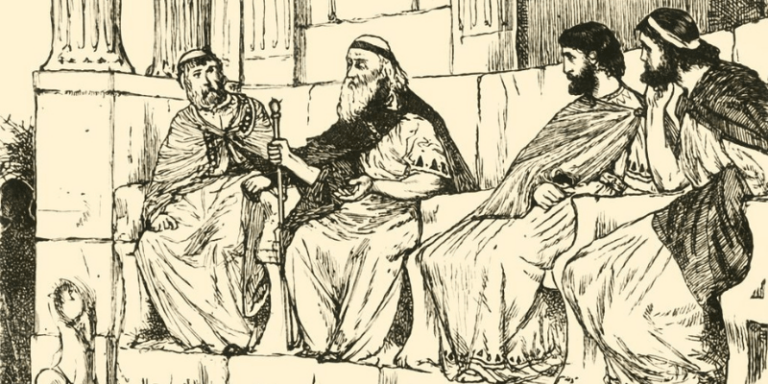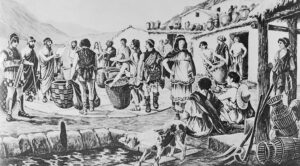The Evolution of Citizens
How citizenship began, and how it has changed over thousands of years.
By: Onar Åm | May 13, 2021 | 682 Words

(Photo by The Print Collector/Heritage Images via Getty Images)
When you are born, you become a citizen of your country. Today, this may seem natural, but it hasn’t always been this way. The idea of citizenship has been traced back to Ancient Greece. Around 2,800 years ago, Greek farmers banded together and created the first city-states. Members of these cities were the world’s first citizens. Their invention made the modern world possible.
Property Rights
Farmers in ancient Greece owned a lot of land that needed protection. There were roaming bandits who wanted to rob them and tyrannical kings who tried to rule them. To protect themselves from this constant threat, the farmers joined together and formed the polis, the city-state. Polis is the Greek word from which we get English words such as “police” and “politics.”

Ancient Greeks paying their taxes with baskets of grain. (Getty Images)
The members, who were called citizens, were expected to pay taxes to fund the city’s defense, building city walls and making weapons. They were also expected to participate in the army to protect against invaders and marauders. In return, the citizens were granted certain rights, such as the right to vote for leaders and the right to own property. The state had a duty to protect their properties and certain freedoms.
With less worry about robbers and tyrants, people could instead focus on producing and trading. The Greek city-states became rich.
Changes in Citizenship
What did citizenship mean in ancient Athens? It was not the same as the modern version.
Most people living in the Greek city-states were not citizens. Only adult men were considered citizens, with the right to vote. Women and children were excluded. Other people refused citizenship status were slaves, as well as visitors or foreigners. Generally, only people born in their city-state could be considered citizens. These other groups did not have the same rights and were not allowed to participate in politics.
Over the millennia, the idea of citizenship has evolved.
Nations across the world have tried various citizenship rules. Today, citizenship has generally expanded to include women and children. Some countries have also limited citizenship to certain races, but that is no longer the case in the West.
Citizenship is no longer limited by birth. People who decide to move overseas can apply to gain citizenship in their new home – usually they must live in the new country for several years and do a lot of paperwork, but it is possible to change their citizenship, or even to become a citizen of more than one country at a time.
Unlike ancient Greece, America has extended citizenship to women and to people who are not born in the country, thereby attracting talents from all over the world. Legal immigrants who are not U.S. citizens are also allowed to own property and do business, but not to vote. They also have to pay taxes.
A Recipe for Success?

(Photo by Sandy Huffaker/Getty Images)
Citizenship is a money-making machine. As in ancient Greece, societies that have strong citizenship rules with property rights and freedoms have become highly successful. It has been documented by the Heritage Foundation’s World Index of Economic Freedom that countries with strong property rights and citizenship requirements are prosperous, secure, and popular.
Despite its successes, in recent years, the concept of citizenship has become controversial.
Advocates of open borders have suggested there should be no citizenship at all, since a person’s citizenship and rights depend largely on where they happen to be born. They say this is unfair. The state of California, for example, has granted more rights to illegal immigrants.
Meanwhile, other countries are doing the opposite. Nations like Singapore, Taiwan, and United Arab Emirates are strengthening their citizenship rules.
Have you given thought to what makes a good citizen? What rights should they be granted? How does citizenship affect the culture and economics of a nation? If you were to create your own country, how would you go about determining citizenship for it?
















